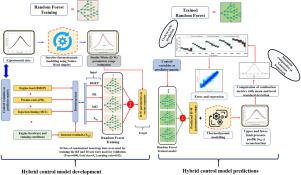Control Engineering Practice ( IF 4.9 ) Pub Date : 2021-06-04 , DOI: 10.1016/j.conengprac.2021.104857 Chinmaya Mishra , P.M.V. Subbarao

|
Reactivity controlled compression ignition (RCCI) engine technology significantly reduces emissions of NO and soot while improving thermal efficiency. RCCI engine development requires optimum in-cylinder combustion metrics as desired objective across different operating conditions. Physics-inspired control models are a cost-competitive option to achieve these objectives in engine control systems. Combining these control models with machine learning can offer computational efficiency, higher accuracy and lower number of experiments needed for control system calibration. In this context, the present paper proposed a novel hybrid control model by combining physics-inspired parametrized double Wiebe function (D-W) and Random Forest Machine Learning (RFML) to predict both the average and cyclic variation trends of combustion metrics in an RCCI engine. In this work, firstly, an optimized D-W parameters matrix was formulated that can stochastically reconstruct pressure cycles in agreement with 99.7% of the experimental confidence interval. RFML was then employed to develop correlative learning models between experimental control variables such as premix ratio, engine load, injection timing etc. with corresponding D-W parameters matrix. The hybrid control model was used to predict peak pressure (PP), indicated mean effective pressure (IMEP), crank angle for 50% of fuel mass fraction burnt () and maximum pressure rise rate (MPRR) across 60 test cases and 36000 cycles. Results showed an error mean and standard deviation () of 0.068 ± 1.840 bar, 0.007 ± 0.264 bar, 0.15 ± 0.98° CA and 0.018 ± 0.221 bar/° CA between predictions and experiment for PP, IMEP, and MPRR, respectively in the tenable RCCI operation regime. Proposed hybrid control model exhibited good accuracy and was able to capture the local cyclic variation trends.
中文翻译:

基于双 Wiebe 函数和随机森林机器学习的 RCCI 发动机混合控制模型的设计、开发和测试
反应性控制压缩点火 (RCCI) 发动机技术显着降低 NO 的排放和烟尘,同时提高热效率。RCCI 发动机开发需要最佳缸内燃烧指标作为不同运行条件下的预期目标。受物理启发的控制模型是在发动机控制系统中实现这些目标的具有成本竞争力的选择。将这些控制模型与机器学习相结合可以提供计算效率、更高的精度和更少的控制系统校准所需的实验次数。在此背景下,本文通过结合受物理启发的参数化双威伯函数 (DW) 和随机森林机器学习 (RFML) 提出了一种新型混合控制模型,以预测 RCCI 发动机中燃烧指标的平均和循环变化趋势。在这项工作中,首先,制定了优化的 DW 参数矩阵,该矩阵可以随机重建压力循环,与 99.7% 的实验置信区间一致。然后采用 RFML 来开发实验控制变量(如预混比、发动机负载、喷射正时等)与相应的 DW 参数矩阵之间的相关学习模型。混合控制模型用于预测峰值压力 (PP)、指示平均有效压力 (IMEP)、50% 燃料质量分数燃烧的曲柄角 () 和 60 个测试用例和 36000 个循环的最大压力上升率 (MPRR)。结果显示误差平均值和标准偏差() 0.068 ± 1.840 bar、0.007 ± 0.264 bar、0.15 ± 0.98° CA 和 0.018 ± 0.221 bar/° CA 之间的 PP、IMEP、 和 MPRR,分别在可维持的 RCCI 操作制度中。所提出的混合控制模型表现出良好的准确性,并且能够捕捉局部循环变化趋势。



























 京公网安备 11010802027423号
京公网安备 11010802027423号